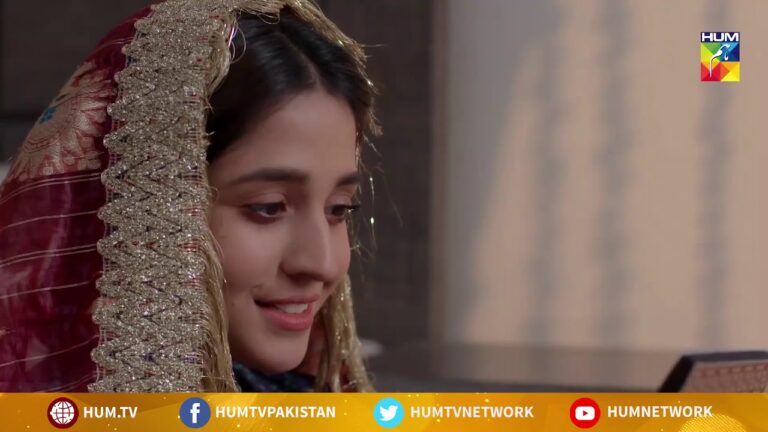Tera Ghum Aur Hum Drama Review: Tera Ghum Aur Hum (Urdu: تیرا غم اور ہم, lit. ”Your Sorrow and Us”) is a 2020 Pakistani drama serial that captivated audiences with its exploration of complex emotions, the enduring power of forgiveness, and the transformative potential of second chances. The narrative follows the journey of Sarah (Azekah Daniel), a woman burdened by the weight of past mistakes, and Arman (Zain Baig), a man seeking solace from his own emotional wounds. This review delves into the drama’s strengths and weaknesses, offering a comprehensive analysis of its impact on viewers.
A Story of Reconciliation and Healing:
Sarah, living in self-imposed exile due to a childhood accident that tragically took the life of Arman’s brother, carries the burden of guilt and societal ostracization. Arman, harboring bitterness and resentment towards Sarah, grapples with the pain of loss and the desire for closure.
As fate brings them face-to-face years later, Sarah seeks forgiveness, while Arman struggles to confront his resentment and revisit the painful past. The narrative explores their individual journeys of grief, the complexities of forgiveness, and the possibility of finding solace and healing through reconciliation.
Strengths of the Drama:
-
Compelling Characters: The characters are the heart of Tera Ghum Aur Hum’s success. Sarah, a flawed yet remorseful individual, resonates with viewers due to her courage to face the past, seek forgiveness, and strive for redemption. Arman, initially consumed by anger and resentment, portrays the complexities of healing and evolving from past trauma. The supporting characters, including Sarah’s family and Arman’s close friend, offer diverse perspectives and emotional support, enriching the narrative’s tapestry.
-
Exploration of Forgiveness: The drama delves deeply into the theme of forgiveness, showcasing its multifaceted nature and the challenges associated with forgiving oneself and others. It portrays forgiveness not as a single act but as a gradual process of emotional healing, requiring empathy, self-reflection, and the courage to confront the past.
-
Engaging Narrative: The drama unfolds at a well-paced and engrossing tempo, seamlessly blending moments of emotional vulnerability, introspection, and glimmers of hope for reconciliation. Flashbacks are effectively used to reveal characters’ past experiences and motivations, adding depth to their emotional complexities and the foundation of their conflict.
-
Depiction of Societal Pressures: While primarily focusing on the characters’ emotional journeys, the drama subtly addresses the influence of societal pressures on individuals, particularly the burden of expectations surrounding forgiveness and reconciliation. It encourages viewers to reflect on the importance of empathy and understanding even amidst societal judgment.
Weaknesses of the Drama:
-
Overused Tropes: While the overall narrative is captivating, the drama utilizes some recurring tropes commonly found in Pakistani dramas. These elements, such as misunderstandings leading to conflict and melodramatic emotional outbursts, might feel slightly predictable to seasoned viewers.
-
Uneven Pacing: At times, the pacing of the drama might feel uneven, with certain storylines progressing rapidly and others dragging slightly. This can occasionally disrupt the overall flow of the narrative and viewer engagement.
Delving Deeper into Tera Ghum Aur Hum: Symbolism, Character Growth, and Long-Term Impact
Building upon the initial review, let’s explore specific aspects of Tera Ghum Aur Hum in greater detail:
Exploring Symbolism and Artistic Choices:
Tera Ghum Aur Hum utilizes various symbolic elements to enhance the narrative’s depth and emotional impact. The recurring motif of rain symbolizes the characters’ cleansing of emotional burdens and the possibility of a fresh start. Both Sarah and Arman experience moments of emotional release and introspection during rainfall, signifying their journeys of healing and letting go of past pain.
The use of contrasting colors is significant. In the initial stages, Sarah’s clothing choices are dominated by dull and muted tones, reflecting her emotional turmoil and the weight of guilt she carries. As she embarks on her journey towards forgiveness and self-acceptance, her attire incorporates brighter shades, symbolizing newfound hope and emotional progress. Similarly, Arman’s initial wardrobe choices are characterized by dark and somber colors, representing his anger and resentment. As he starts to heal and embrace the possibility of forgiveness, his clothing incorporates lighter colors, reflecting a shift towards acceptance and emotional growth.
The director utilizes close-up shots to capture the emotional nuances of the characters, allowing viewers to connect with their internal struggles and triumphs. Slow-motion sequences are used effectively during pivotal moments of reconciliation and forgiveness, emphasizing the emotional weight of these scenes and the characters’ significant emotional milestones.
Beyond Forgiveness: Exploring Character Growth and Internal Conflicts:
While forgiveness is a central theme in Tera Ghum Aur Hum, the drama goes beyond a simplistic portrayal of letting go. It delves into the complexities of the characters’ internal conflicts, showcasing their individual journeys through self-doubt, societal pressures, and emotional challenges.
Sarah’s journey towards redemption is not linear. She faces moments of self-reproach, societal judgment, and the burden of unrealistic expectations. The drama realistically portrays the challenges of confronting past mistakes and seeking forgiveness, showcasing the internal strength and perseverance required for self-discovery and emotional growth.
Arman’s journey is equally nuanced. He grapples with conflicting emotions: anger, resentment, and the desire for closure. The drama explores his internal struggle between clinging to the past and embracing the possibility of forgiveness and healing. This adds depth to his character and allows viewers to empathize with his complex emotional journey.
Beyond the Screen: Legacy and Long-Term Impact:
Tera Ghum Aur Hum’s legacy extends beyond its entertainment value. The drama sparked important conversations about the importance of open communication, breaking free from the shackles of the past, and embracing the transformative power of forgiveness. It encouraged viewers to challenge societal judgments surrounding forgiveness and the courage required to confront past actions and their consequences.
Furthermore, the drama resonated with a global audience by offering a relatable narrative of emotional healing, navigating the complexities of human relationships, and the enduring power of love and forgiveness. Sarah and Arman’s journey serves as an inspiration for individuals facing emotional burdens, harboring past regrets, and seeking the courage to forgive, seek forgiveness, and move forward in life with compassion and acceptance.
Overall Impact:
Despite its minor shortcomings, Tera Ghum Aur Hum remains a compelling and impactful drama. Its exploration of the complexities of forgiveness, relatable characters, and thought-provoking themes leave a lasting impression on viewers. The drama encourages viewers to embrace the power of forgiveness, overcome the limitations of the past, and believe in the transformative power of second chances.
Beyond the Screen: Legacy and Social Discourse:
Tera Ghum Aur Hum sparked important conversations about the importance of open communication, empathy, and challenging preconceived notions about forgiveness. It encouraged viewers to reflect on the complexities of human relationships, the enduring impact of past actions, and the potential for healing and reconciliation even in the face of seemingly insurmountable challenges.
Furthermore, the drama resonated with a global audience by offering a relatable narrative of emotional growth, navigating the burden of past mistakes, and the transformative power of love and forgiveness. Sarah and Arman’s journey serves as an inspiration for individuals facing emotional burdens, past regrets, and the challenges of finding the courage to forgive, seek forgiveness, and move forward in life.
Conclusion:
Tera Ghum Aur Hum transcends the boundaries of a conventional love story. It delves into complex characters, explores themes of forgiveness, healing, and societal pressures with nuance, and offers a powerful message about the transformative potential of confronting the past, embracing forgiveness, and believing in the possibility of second chances in love and life. While the drama has its shortcomings,










+ There are no comments
Add yours